













The Namibian Chamber of Environment (NCE) is an umbrella Association that provides a forum and mouthpiece for the broader environment sector, that can lobby with government and other parties, that can raise funds for its members and that can represent the sector.
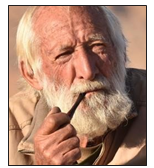
The GOSCARs – the Grassroots Owen-Smith Community Ranger Awards 2026
The 2026 Grassroots Owen-Smith Community Conservation awards are open for nominations. This annual event, recognising excellence in the field in memory of the life and work of the late Garth Owen-Smith, focuses on the rural men and women who work for conservancies, community forests, residence trusts and community fish reserves. Each individual award is N$30 000, with N$10 000 of this going to the ranger's community-based organisation. A CBO award of N$100 000 may also be made to an organisation that is doing an outstanding job in managing and protecting its wildlife and other valuable natural resources.

Near-Endemic Plants Photo Competition
The NCE’s Near-Endemic Plants Project is preparing information sheets about Namibia’s near-endemic plants. These sheets will be available online through the Namibian Environmental Information Service - EIS.
We need your help in getting photos of near-endemic plants – a list of which you can find on the EIS’s Plant Information System. We are still looking for photos of species on this list for which we have none at all.
The JRS Biodiversity Foundation has made available prize money for the persons that submit the most records and photos of near-endemic plants to the EIS’s Indigenous Plant Atlas.
- 1st prize = N$3000
- 2nd prize = N$2000
- 3rd prize = N$1000
- 5 consolation prizes of N$425 each
Rules:
Competition closes on 31 October 2025.
Records and photos must be submitted to the Indigenous Plant Atlas on the EIS.
Only records of near-endemic species will be counted; where there is a tie, other plant records submitted will be considered.
A species will be counted only once per quarter-degree square per atlaser.
The atlaser must agree to the photo being used on the information sheet that will be put online (with due acknowledgement).
For any queries, please contact the project at boscia.nam@gmail.com

NCE Bursary Fund now open
We are now accepting applications for our bursary fund. The closing date is 22 November 2024. Applications must be submitted by email.
The NCE Fund was established in 2017, with the purpose of providing financial assistance to individuals who are enrolled, or wish to enroll, in conservation-related, environmental, or sustainable development studies, mainly at the level of master’s degree or equivalent.
Financial assistance is based on the financial situation of the applicant, chances of success in post-graduate studies based on performance to date, the current position held by the applicant, the applicant’s track record of commitment and self-motivation, leadership potential, the course being pursued, and availability of NCE funds. The Fund will only assist students for the 2025 academic year. The fund is not intended for students looking for funds for outstanding tuition fees for the 2024 academic year.
Download the 2025 Bursary Application form in word here, and in pdf here. Priority research topics for 2025 can be found here. In addition to a academic bursary, funding towards field research costs will also be provided.

The GOSCARs – the Grassroots Owen-Smith Community Ranger Awards 2025
The GOSCARs - The Grassroots Owen-Smith Community Ranger Awards will be presented annually to top-performing Namibian conservancy game guards, conservancy lion or rhino rangers, fish guards or community resource monitors.
The awards recognise the men and women who work and walk in the field, and are the people the late Garth Owen-Smith would want honoured in his name. There will also be a N$100 000 award for the best conservancy in Namibia!
Background information and nomination forms can be found using the link below. The deadline for nominations is 28 February 2025.
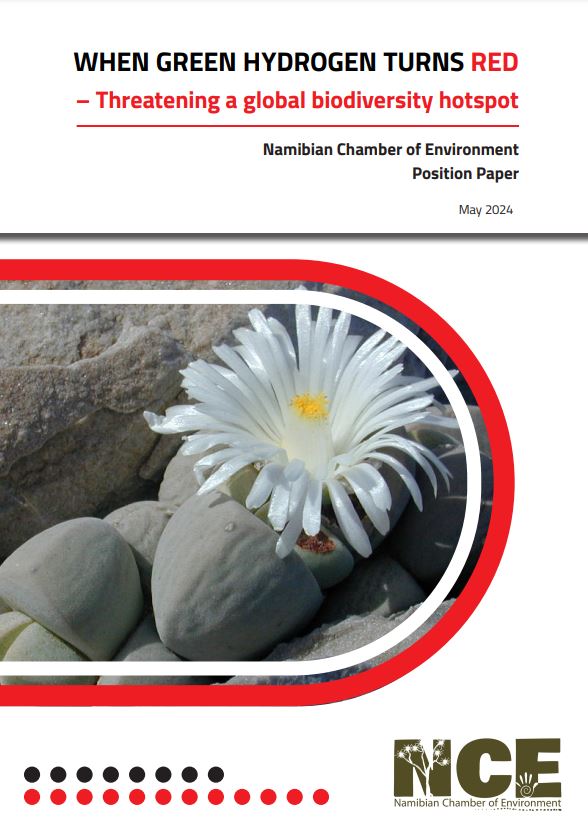
NCE Position Paper on the proposed Green Hydrogen developments in the Tsau ||Khaeb (Sperrgebiet) National Park (TKNP)
On this International Day for Biodiversity, Wednesday 22 May 2024, the Namibian Chamber of Environment (NCE) is pleased to share with you its Position Paper on the proposed Green Hydrogen developments in the Tsau ||Khaeb (Sperrgebiet) National Park (TKNP) in Namibia (see below).
The TKNP is within one of only 36 global biodiversity hotspots. It is Namibia’s most biodiverse national park. It has more endemic and near-endemic species (species that occur no-where else on earth) than any other national park in Namibia. The global importance of this national park is greater than all the national parks in Germany, which would be the main recipient of green hydrogen produced in the TKNP. The damage to the integrity, biodiversity, landscape, sense of place and future tourism will be immense, all in the interests of serving the relatively short-term energy needs of mainly Germany and some other parts of the EU. We don’t believe that the people of Germany would allow the destruction of any of their national parks for energy production, and we ask them to tell their government that it is morally wrong to offshore the environmental costs of their energy needs to Namibia.
The Namibian Chamber of Environment, an IUCN Member, fully supports the IUCN position that initiatives to mitigate climate change should never come at the expense of biodiversity. These are the two greatest environmental challenges facing the planet and it is profoundly wrong and counter-productive to mitigate one at the expense of the other.
With such potential damage to one of Namibia’s most globally important national parks and to our biodiversity, could this hydrogen really be called “green”? We would suggest that RED hydrogen is a more appropriate name – because industrialising the TKNP will drive many species onto the biodiversity Red List and hydrogen produced in the TKNP will carry the blood of its lost biodiversity.
We call on the Namibian government, the German government and the European Union to immediately commission an independent and transparent Strategic Environmental Assessment (SEA) of the green hydrogen sector in Namibia with broad public consultation, to plan the most effective way forward for Namibia. We also request a meeting with the German Minister of Environment to explain the importance and significance of the TKNP and the damage which the production of green hydrogen in that sensitive area will do to its biodiversity, its future and the reputations of all who facilitate its development.

JRS Biodiversity Foundation Funding
The NCE is pleased to announce that it was successful in obtaining funding from the JRS Biodiversity Foundation (Home - JRS Biodiversity Foundation) for a project “Better information for better conservation, restoration and sustainable use - focusing on Namibian near-endemic plants”.
The aims are to bring together all existing data from a variety of sources throughout the world, analyse and summarise these for placement on the Plant Information System website of the Environmental Information Service (EIS). This information will be freely accessible and will be useful for many practical applications, like environmental impact assessments, conservation and restoration actions or sustainable use of plant resources. Namibian botanist, Herta Kolberg, will be leading this project and in the process transfer much of her accumulated experience and knowledge to the younger generation of plant scientists. To accomplish this huge task we decided to start with the near-endemic plants, of which the larger part of their distribution range lies within Namibia with a smaller portion in Angola or South Africa. The project started in mid-May 2023 and will run for 30 months.
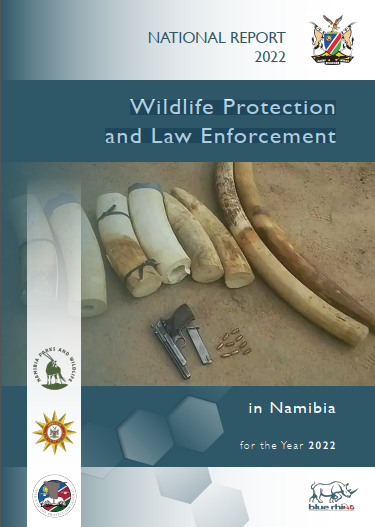
Wildlife Crime Report for 2022

The GOSCARs – the Grassroots Owen-Smith Community Ranger Awards- Now OPEN- Closing 02 February 2024
The GOSCARs - The Grassroots Owen-Smith Community Ranger Awards will be presented annually to top-performing Namibian conservancy game guards, conservancy lion or rhino rangers, fish guards or community resource monitors.
The awards recognise the men and women who work and walk in the field, and are the people the late Garth Owen-Smith would want honoured in his name. There will also be a N$100 000 award for the best conservancy in Namibia!
Background information and nomination forms can be found using the link below.
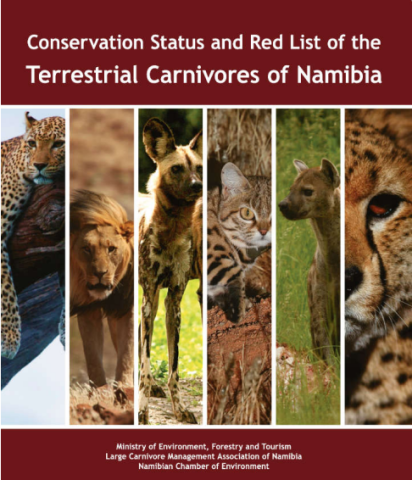
Press release – Publication of Conservation Status and Red List of the Terrestrial Carnivores of Namibia
Conservation Status and Red List of the Terrestrial Carnivores of Namibia Book now available.
Published in 2022 by Ministry of Environment, Forestry and Tourism; Large Carnivore Management Association of Namibia; Namibian Chamber of Environment.
Access the book and associated poster free online at: http://the-eis.com/elibrary/search/27193
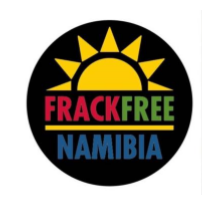
Frack Free Namibia Press Release
ReconAfrica’s Seismic “Thumper” Survey Levels Wilderness and Damages Homes in Kavango East.
The Namibian NGO Frack Free Namibia (FFN) was established in 2020 with a mission to oppose oil and gas exploration within the geological limits of the Okavango Basin and collaborate on local solutions aimed at socio-economic and environmental justice for Indigenous Peoples and local communities in Namibia.
Due to ongoing security and legal threats and intimidation against community members, journalists and researchers, the authors, researchers and interviewed community members have chosen to remain anonymous. Further information can be obtained from Frack Free Namibia.
